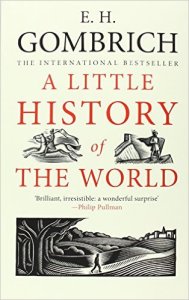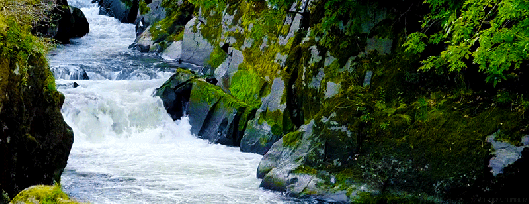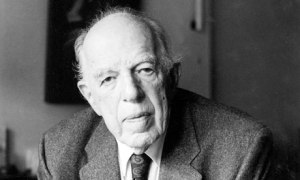Tags
A Little History of The World, Book Review, Children's Book Review, E.H. Gombrich, Ethics, History, Philosophy
Santa Claus doesn’t exist – when should the children be told about history?
 E.H. Gombrich is probably best known as the author of a wonderful book on the History of Art, which I guess must have made its way, at some time, to every Art lovers bookshelf.
E.H. Gombrich is probably best known as the author of a wonderful book on the History of Art, which I guess must have made its way, at some time, to every Art lovers bookshelf.
I recently discovered that he had, as a young man, written a wonderful history book for children, which was published in Austria in 1935, much later, translated into twenty five languages, , but only towards the end of Gombrich’s life (he died in 2001) did he produce an English version. This has also updated the History, taking it to the collapse of the Soviet bloc. Gombrich, born in Vienna in 1909, was an Austrian Jew, and made his home in England in 1936.
He originally wrote A Little History of The World, a history book for children, when he had been commissioned to translate an English history book into German. Gombrich was not very complimentary about the history book, instead, suggested to be publisher that he could do rather better, by writing a book about history himself, for children, The publisher took him up on this, and, quite astonishingly, he wrote his wonderful ‘little history’ in 6 weeks .
The sweep of this effortlessly readable book starts in prehistory, and in 40 chapters arrives at the tail end of the twentieth century.
Whilst there is a major focus on European history, what Gombrich is really looking at is a kind of exploration of empires – whether these are empires of the mind, of ideology, ideas, religions, politics and of course the regrettable history of empires won and lost through club, sword, firearm, bomb and all the rest of mankind’s panoply of destructive devices.
It has to be said, an account of several thousands of years of interminable war, war which almost every tribe humanity might belong to (whether city states, nation states, countries, followers of religious, political or other belief systems) seems, if it gets any sort of power, to want to batter another grouping into submission to, makes for pretty depressing, despairing reading. In some ways, stunning though this is, I’m quite glad I didn’t read it as a child, since I’m pretty sure I might have succumbed to hopelessness.
What absolutely makes this book at all possible, in terms of a sensitive young mind not getting overwhelmed and distraught by our peculiar species, is the great warmth, the immense humanity, and, yes, despite our bloody history, the compassionate optimism of Gombrich, who at every turn also sees the wonders and the marvels, the intelligence, the curiosity, the excitement and the heart that is also humanity’s heritage.
And then there is the far from small matter that he writes like a dream, talks directly to, rather than down to, his intended young audience – not to mention his admiring older audience.
He will, I hope, reach small people who might, by this, want to take charge of learning the sad lessons of the past, in order to help us to better avoid repeating errors in the future.

Here is Gombrich, with a wonderfully poetic and heartfelt, not to mention wise and encouraging, exhortation to his young audience, on the theme of time, and history itself, as a river. He has taken his audience on an imaginary journey, flying along the river of time, from prehistory to the present, and presents this spacious, soulful image
From close up, we can see it is a real river, with rippling waves like the sea. A strong wind is blowing and there are little crests of foam on the waves. Look carefully at the millions of shimmering white bubbles rising and then vanishing with each wave. Over and over again, new bubbles come to the surface and then vanish in time with the waves. For a brief moment they are lifted on the wave’s crest and then they sink down and are seen no more. We are like that. Each one of us no more than a tiny glimmering thing, a sparkling droplet on the waves of time which flow past beneath us into an unknown, misty future. We leap up, look around us and, before we know it, we vanish again. We can hardly be seen in the great river of time. New drops keep rising to the surface. And what we call our fate is no more than our struggle in that multitude of droplets in the rise and fall of one wave. But we must make use of that moment. It is worth the effort.
This is a marvellous, fascinating, deeply thought provoking, highly engaging and interesting book
It is beautifully complemented by woodcut images at the head of each chapter, by Clifford Harper
A Little History of the World Amazon UK
A Little History of the World Amazon USA

What a lovely post – and the book sounds wonderful. Have you read his art book, and would you recommend it?
Oh yes, indeed, Kaggsy. I bought it way back when, and it is still there, somewhat battered, on my bookshelves. It’s a lovely book (for adults, this time) and designed for the interested layperson really, but various friends who were studying art or at art college also had copies!
Excellent! I class myself as an interested layperson, so I’ll look out for it!
Very lovely review indeed and long live compassionate optimism, especially in the light of today’s tragic news from Paris. This is a book I will look out for.
Yes, there are times when holding compassionate optimism needs conscious attention paying. And finding ways to connect with the aspirations to make a better, kinder, world for ourselves and each other which are almost always reachable by us in ourselves and each other, when we look for them, becomes ever more crucial. If we could truly see humanity in each other, our history would have been very different.
Writers, whether writing fiction or non-fiction, who come from that place, however difficult to get to it, are a great inspiration and reminder that our complicated nature seeks to grow, expand, reach the light of compassion and reason working together, just as much as it can fall back into some kind of primeval slime of violent eruptions and painful, angry, fearful savagery, some enraged lashing out at other. That place of reaction is like biting your own leg off to free yourself from a trap which you yourself created in the first place.
His book on art is a much treasured item in our house, it’s come to my rescue several times when I had to write some assignments on art history and had absolutely no clue where to begin. I didnt know about the history book though but it does sound right up my street
By all accounts there was a programme about Gombrich on UK TV a while ago, and two friends independently told me about it, and mentioned he had written history as well as art history. Which sent me post haste to discover this one. It’s not quite as visually beautiful, obviously, as the art one, but still, a fabulous read. I’ve just bought Andrew Marr’s covering the same territory, for adults, and it will be interesting to read and compare
This sounds like such a beautiful book (and from an author I’d never even heard of – to my shame). Thank you so much for sharing.
You are so welcome Shoshi! It’s always a pleasure to share wonderful books, and is no doubt part of why we blog, hoping to share a wonderful experience. Aren’t we lucky that wonderful reads can be shared without depleting supplies – you couldn’t share a box of delicious chocolates with hundreds of people ( not unless it were gigantic) , but a book is a pleasure which gets more intensely pleasurable when others delight in it too!
I love your comparison! There really is nothing like being able to share a great book.
I read this to review it as use for high school students.This book on history is simple and insightful. There are many things I learned despite having taken multiple courses in world history.However it was be aware it is very Eurocentric.
Yes, I do think that this – the Eurocentric focus – is/was also symptomatic of the time of its initial writing, and that Gombrich probably widened his focus and got outside Europe more than many others.